People have been making bone broth for ages. Many of us remember being served chicken soup “back in the day” as a remedy to sickness and there’s good reason for it. Somewhere along the way though, bone broth was laid aside and forgotten – probably during the wake of highly processed, addictive and convenient “franken-foods.” But it’s back, and we’ve never needed it’s healing benefits more.
why it's good for you

The two major benefits of bone broth are 1) it provides instantly bioavailable nutrients (meaning our bodies can digest them with ease), and 2) its amino acid profile and high gelatin content not only soothes and heals the gut, but amplifies nutrient absorption as well. It’s a win/win.
The amino acids found in bone broth are not only important when it comes to gut health, but
they can be difficult to obtain from diet alone.
These include:
● Proline: The body uses this to make collagen. Proline helps the body break down proteins and improves skin elasticity and smoothness (which equals less wrinkles – yay for women everywhere!). But more importantly, it is beneficial to the heart and can keep arteries from stiffening. Pretty important stuff.
● Glycine: Necessary for many systems, including digestive health. It is necessary for the production of glutathione (considered our body’s master antioxidant, which helps to handle infection and inflammation), for blood sugar regulation and digestion. It can also enhance muscle repair and growth by increasing levels of creatine. Kind of a big deal.
● Arginine: Aids in proper kidney function and wound healing. Also kind of a big deal.
● Glutamine: L-glutamine contributes to gut health. Bone broth is an excellent source of glutamine. And who doesn’t need gut health support these days?
Since bone broth is so healing to the gut due to its high gelatin/collagen content, it also acts to reduce inflammation. Double bonus. This makes it very beneficial for healing leaky gut and helping with digestive problems.
How much bone broth?
A mug in the morning is good enough for some. Others find benefits in drinking it throughout the day. It’s going to be completely subjective – according to each’s own body. Start with a cup in the morning and go from there.

do ingredients matter?
Of course they do! Using bones from grass-fed, pastured animals will yield a more nutrient dense broth. The long cooking process and use of apple cider vinegar extracts the vitamins and minerals from the bones, so using the highest quality bones will result in bone broth that packs a powerful nutrient punch. My motto is: Do the best you can with what you have. So if these grass-fed, pastured animal bones don’t fit into your budget – simply do your best with what works for you.

You can use any of the following types of bones (and you can even combine different types in one batch of broth, which is how I make it most times): beef, veal, lamb, bison, buffalo, pork, goose, turkey, chicken, or fish (including the head) to make bone broth. I personally believe poultry yields the mildest tasting broth, so you may want to start there if you’re a bone broth newbie. Aim for a variety of meat bones like marrow bones, oxtail, and/or “soup bones.” I save all bones from the meals I make (whole chickens, turkey, pork chops, roasts, etc.) and store them in the freezer until I’m ready to make a batch. Call me crazy, but I’ve even included a few chicken feet and/or necks for added collagen and nutrients.
If you’re using organic vegetables in your broth, there’s no need for harsh scrubbing. In fact, a light rinse will do the trick so that valuable probiotics from the organic soil will be included in your broth. You can even use ugly vegetables and not even care how you cut them, as long as they fit in your pot.
what else can you do with bone broth?

So many things! You can make soup (just add some protein and veggies and simmer for an hour), gravy, stews, chili, simmer your veggies (or rice or potatoes) in – the possibilities are endless! . You can even freeze it in ice trays so that it’s convenient to consume and use!
must i make my own broth?
Heavens, no! These days, there are many high quality bone broths on the market. Check your local supermarket for an organic variety preferably made with grass-fed, pastured bones or find some great brands online. There’s even bone broth protein powder these days – so look for that, too. *Just be sure to always read ingredients as many contain sugar or other undesirable additives.
Final thoughts
Using bone broth to replace meals is very healing to your digestive system, since it allows your body to rest, rather than be busy about digesting whole foods. Not only delicious, but rich in glycine – an amino acid found in collagen, which is an important protein for maintaining a healthy gut lining. Keeping it in perspective, boxed bone broth in the supermarket is better than no bone broth at all. Just remember to read that ingredient list!




